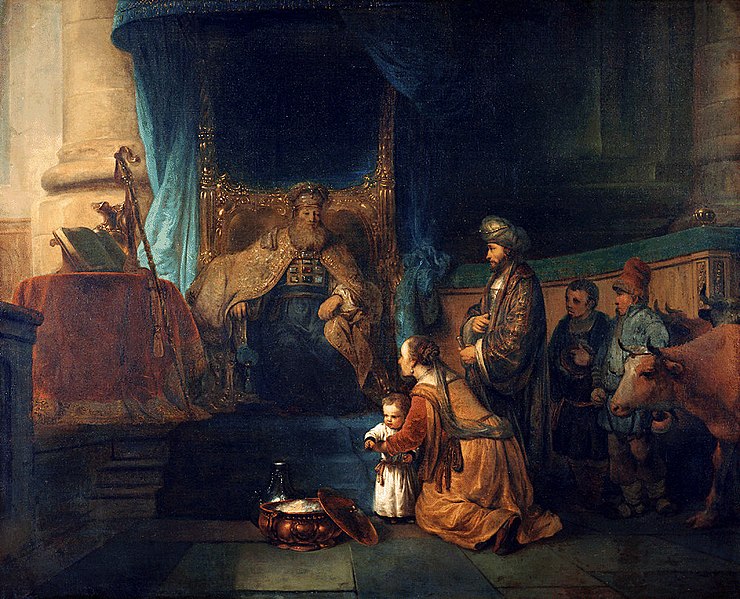聖書は、待ち続けた人の話にあふれている。はっきり何年待ったとは書かれていないが、ハンナは息子サムエルが与えられるまで待ち続けた。イスラエルの民は、自分の国に帰るのを許されるまで70年間、荒れ野で待った。ユダヤの民は、約束された救い主が来られるのを何百年も待った。
[toggle]Scripture is filled with stories of people who waited. Hannah waited for an unspecified number of years before having her son Samuel. The Israelites waited 70 years in exile before being allowed to return to their homeland. The Jewish people waited hundreds of years for the promised Messiah. [/toggle]
ヘルブラント・ファン・デン・エークハウト「祭司エリに息子サムエルをささげるハンナ」
アドベントの間、待つことが聖(きよ)く、特別なことであると再確認できる。私たちはみな、人生に希望や望みを抱いている。関係の修復や、わがままなわが子が信仰に立ち返る日、わが子を腕に抱く日、その日が来るのを待っているのだ。
待つのに、はっきりとした終わりのあるものもある。転職の採用通知であれ、期末テストの結果であれ、結婚式であれ、必ずその日がやって来ると分かっていて、「どうなるだろう」と思いながら待つこともある。このようなことでも、待つ間にはフラストレーションがたまるが、それでも待つことには必ず終わりが来る。
[toggle]During Advent, we are reminded of the significance and holiness of waiting. All of us carry hopes and desires for our lives: We’re waiting for a relationship to heal, for a wayward child to return to faith, for a baby to arrive in our arms. Some waiting is definite—it has an endpoint. We experience “definite waiting” when we anticipate outcomes that we know will eventually arrive, whether it’s a verdict on a new job, a grade on a final exam, or a wedding day. Although these experiences are often laced with frustrations and the outcomes mixed, the waiting will eventually come to an end. [/toggle]イエスの母マリアは天使ガブリエルに「子を産む」と告げられ、待つことを経験した。困難な状況があっただろうことは疑う余地もないが、十月十日経てば約束された赤ちゃんが生まれ、待つことに終わりが来ることが分かっていた。天使への返事にさえ、それが確かだと分かっていたことがうかがえる。「わたしは主のはしためです。お言葉どおり、この身に成りますように」(ルカ1:38)
[toggle]Mary the mother of Jesus experienced definite waiting when the angel Gabriel announced that she would be “with child.” Although the process was undoubtedly difficult at times, she knew that in nine months, the promised child would put an end to her waiting. Even in her reply to the angel, we hear a level of certainty. “‘I am the Lord’s servant,’ she answered. ‘May your word to me be fulfilled’” (Luke 1:38). [/toggle]しかし、待つことに終わりが来ないこともある。
[toggle]Some waiting, however, is indefinite. [/toggle]私の人生において、いつまでも待ち続けていることに「結婚」がある。何年間も、主に従う男性との出会いを祈ってきた。結婚によってもたらされる愛と親密さを望んだだけでなく、良い婚姻関係によって互いが向上するのを見てきたからだ。愛すること、仕えること、そして神様をほめたたえることに。
私の独身時代は、はっきりとした終わりの時のないまま、「はい」も「いいえ」もなく待つという時間だ。時には、「神様はどんな男性を私の人生に用意してくださっているのか」と希望にあふれることもあるし、「独身でいる自分を神様がどう用いてくださるのか」と期待することもある。しかし、希望と同時に「もう嫌だ」という絶望もあるのも事実だ。
[toggle]In my own life, indefinite waiting has come in the form of singleness. For years I’ve prayed to meet a godly man, not only because I desire the kind of love and companionship that marriage brings, but also because I’ve seen how good marriages can make each spouse better able to love, serve, and glorify God. My single years have been a period of waiting without a clear end point, without any promise of a “yes” or even a definitive “no.” At times, I’m filled with hope for the kind of man God may bring into my life and also for what God can do in and through my singleness, but there’s also a desperation mixed in with my hope that I wish I could be rid of. [/toggle]恋愛関係がうまくいかない中で、聖書のハンナの話をよく読んだ。ハンナは何年も子どものために祈った。自分には赤ちゃんができないのに、別な妻が子どもを産むのを見てきたが、ついに神様がサムエルを与えてくださって喜んだ。祈ってから子どもが与えられるまでが書かれている数行は、じつは何年もの間が空いている。どのくらいかかったのか、聖書にもはっきりとは書かれていない。「ハンナは身ごもり、月が満ちて男の子を産んだ。主に願って得た子供なので、その名をサムエル(その名は神)と名付けた」(サムエル上1:20)。彼女の願いはついにかなえられたが、ハンナの話から分かることは、神様のタイミングは私たちのものと同じではないということだ。
[toggle]In the midst of my relational uncertainty, I have read and reread the biblical story of Hannah. She prayed for children for years, saw her husband’s other wife bear children while her own womb remained empty, and then rejoiced when God eventually gave her a “yes” named Samuel. Many years passed between the paragraphs of her praying and the eventual baby. Even the way it’s phrased in the New International Version leaves the timing ambiguous: “So in the course of time Hannah became pregnant and gave birth to a son. She named him Samuel, saying, ‘Because I asked the Lord for him’” (1 Sam. 1:20). Although her desire eventually came to fruition, nonetheless, Hannah’s story is a reminder of God’s timing and how his plans don’t always match up with our own. [/toggle]マリアやハンナの話には、よく知られた結果がある。しかし、私たちはどうだろう。私たちの信仰は、結果がなければどうなるだろう。主に願い、望み、その結果得たのが沈黙なのだろうか。自分の願いがかなえられないとき、ハンナの「主に願って得た」という部分は読むことも難しい。
[toggle]Stories like Mary’s and Hannah’s have known outcomes, but what happens to us—and to our faith—when ours do not? When we ask and ask of the Lord, and seemingly receive silence in reply? Hannah’s statement, “Because I asked the Lord for him,” is difficult to read at times, when our hopes feel unfulfilled. [/toggle]待つことに終わりがなく、「どうなるのか」と思っている私たちにとって、アドベントはつらい時期だ。「私たちの心にあるどんな願いもかなえてくれる」とは神様は言っていない。その代わり、神様はご自身を約束された。「私たちはもう独りぼっちじゃない」とディートリヒ・ボンヘッファーは書いている。「神が共にいてくださる。もうホームレスではない。永遠の家庭そのものがほんの少し私たちの内に来てくださったからだ」
[toggle]It’s here in the undefined waiting and wandering that Advent challenges us the most. This season reminds us that God has not promised us every little or big desire of our heart—instead, he promised us himself. “We are no longer alone,” writes Dietrich Bonhoeffer, “God is with us. We are no longer homeless; a bit of the eternal home itself has moved unto us.” [/toggle]これこそ、クリスチャンの信仰のカギとなる。待たされていても、待たされている間も、そして待たされているからこそ、神を信じることが良いのだ。1日であろうと、1カ月であろうと、20年以上であろうと、待ち続ける私たちの希望は神にある。神秘的な三位一体の神が、人となって生まれ、赤ちゃんになって飼い葉おけに寝かせられ、私たちのために死んだ。
[toggle]This is one of the key tensions of the Christian faith—to believe God is good not despite our waiting, but in it, and perhaps even because of it. Whether we’ve been waiting for a day, a month, or 20 years, our hope dwells in him—the incarnate God with his mysterious three-in-one nature, the baby in the manger who was born for us and then died for us. [/toggle]しかしながら私たちは、自分の望んだとおりになるかどうかを知りながら待っているのではない。なぜなら神様は、癒やしも、家も、夫も、この世のものについては何も約束していないのだから。アドベントに私たちは痛みを伴って思い知らされる。大きなものも小さなものも、この世で正しいものなどないのだ。ボンヘッファーはこう続ける。「私たちの全人生がアドベントなのだ。つまり、私たちは新しい天と新しい地ができるその究極の時を待っているのだ」
[toggle]However, we don’t wait knowing that everything will turn out the way we want it to on this earth, because God does not promise us healing, houses, or husbands. Advent is a painful and necessary reminder that in ways both big and small, all is not yet right in our world. Bonhoeffer goes on to say, “Our whole life, however, is Advent—that is, a time of waiting for the ultimate, for the time when there will be a new heaven and a new earth.” [/toggle]アドベントには、二つの気持ちの間で心が揺れ動く。願うことと、その答えを待ちわびること。傷つくことと、癒やしを求めること。そのような中であっても、神様を信頼することが大切だ。望みに答えられないのは、神様が意地悪をしているのではなく、私たちを愛しているからこそであり、この世ではそれをはっきり理解することができないのだ。
[toggle]Advent challenges us to live in this tension between hope and waiting, brokenness and healing, all the while trusting that God is not withholding gifts from us out of cruelty but out of a love we may not be able to understand on this side of heaven. [/toggle]私の独身時代はいつまで続くのか分からないが、「肉となって、わたしたちの間に宿られた」(ヨハネ1:14)イエスを見上げよう。独身でも、結婚していても、私たちの誰もが何かを待ちわびている。そして、神様の約束はいつも変わらない。
[toggle]As my singleness continues into the unknown future, I look to Jesus, the God who “became flesh and made his dwelling among us” (John 1:14). For all of us, single or married, the particularities of our waiting may be different, but the promises of God will always be the same. [/toggle]執筆者のブライアナ・デュイットはミシガン州グランドラピッズ在住。
本記事は「クリスチャニティー・トゥデイ」(米国)より翻訳、転載しました。翻訳にあたって、多少の省略をしています。
